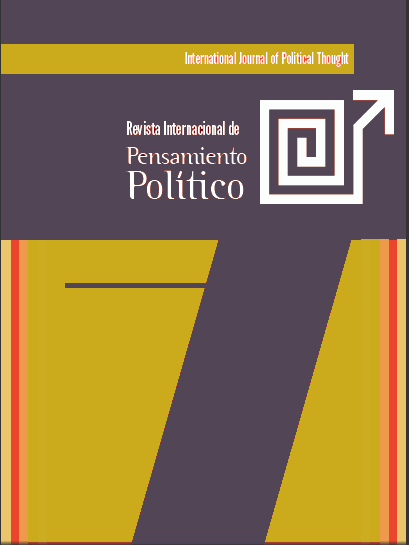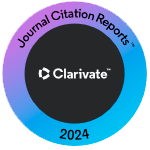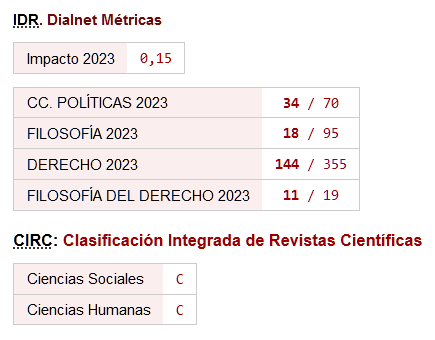Democracia de la vigilancia
datos, activismo y contrapoder
DOI:
https://doi.org/10.46661/revintpensampolit.9612Palabras clave:
democracia de la vigilancia, vigilancia social masiva, despotismo democrático, despotismo tecnológico, datactivismo, datahackerismoResumen
Esta investigación analiza críticamente el actual contexto sociopolítico y económico de vigilancia masiva para reconstruir las claves y condiciones de posibilidad que orientan su desarrollo en sentido justo y responsable. El estudio, por un lado, advierte del peligro de los impactos disruptivos que produce sobre la sociedad y sus diferentes esferas funcionales la vigilancia social masiva ejercida por los estados y las grandes corporaciones tecnológicas. Por otro, de forma más concreta, sugiere que esta vigilancia social masiva está dando lugar a prácticas despóticas que pervierten los procesos democráticos, reducen los espacios de libertad y aumentan la brecha de las desigualdades. Finalmente, desde sus presupuestos normativos y condiciones de posibilidad, ofrece orientaciones para hacer frente a la vigilancia social masiva: la promoción de una sociedad civil fuerte, dinámica y crítica que actúe como contrapoder frente al estado y las grandes tecnológicas.
Descargas
Citas
Apel, K-O. (1985). La transformación de la filosofía. Taurus.
AppleInsider Staff (2016). Apple hires firmware security experts who worked on Thunderstrike 2 exploit. AI. https://shre.ink/9Q7L
Armenteras, D., González, T. M., Vergara, L. K., Luque, F. J., Rodríguez, N., y Bonilla, M. A. (2016). “A review of the ecosystem concept as a “unit of nature” 80 years after its formulation”. Ecosistemas, 25(1), 83-89. https://doi.org/10.7818/ECOS.2016.25-1.12 DOI: https://doi.org/10.7818/ECOS.2016.25-1.12
Bartlett, J. (2018). The People Vs Tech: How the internet is killing democracy (and how we save it). Penguin Random House.
Boffey, Ph.M. (1971). “Nader and the Scientists: A call for responsibility”. Science, 171 (3971), 549-551. https://doi.org/10.1126/science.171.3971.549 DOI: https://doi.org/10.1126/science.171.3971.549
Caffarena, V. A. (2017). “El valor del activismo de datos en el trabajo de la sociedad civil”. Digitos, 1(3), 199-220. https://doi.org/10.7203/rd.v1i3.68 DOI: https://doi.org/10.7203/rd.v1i3.68
Cave, D., Hoffman, S., Joske, A., Ryan, F., y Thomas, E. (2019). Mapping China’s technology giants (N.º 15/2019). The Australian Strategic Policy Institute
Clarke, R. A., Morell, M. J., Stone, G. R., Sunstein, C. R., y Swire, P. (2014). The NSA Report: liberty and security in a changing world. Princeton University Press. https://doi.org/10.2307/j.ctt5vjvbs DOI: https://doi.org/10.2307/j.ctt5vjvbs
Calvo, P. (2016): “Whistleblowing ante la miseria moral de instituciones y organizaciones”, en: J. V. Meseguer y M. Avilés (dirs.). Empresa, Derechos Humanos y RSC. Una mirada holística desde las Ciencias Sociales y Jurídicas. Pamplona: Aranzadi Thomson Reuters, pp. 135-153.
Calvo, P. (2020). “Democracia aumentada. Un ecosistema ciberético para una participación política basada en algoritmos”, Ápeiron. Estudios de Filosofía, vol. 12, pp. 129-141.
Calvo, P. y Osal, C. (2018). “Whistleblowing y datos masivos: monitorización y cumplimiento de la ética y la responsabilidad social”. El profesional de la información, vol. 27, n. 1, pp. 137-184. DOI: https://doi.org/10.3145/epi.2018.ene.16
Conill, J. (2006). Ética hermenéutica. Crítica desde la facticidad. Madrid, Tecnos.
Conill, J. (2008). “Hermenéutica crítica desde la facticidad de la experiencia”. Convivium. Revista de filosofía (21), 31-40.
Cortina, A. (1985). “La hermenéutica crítica en Apel y Habermas. ¿Ciencia reconstructiva o hermenéutica trascendental?”. Estudios Filosóficos, 34 (95), 83-114.
Cortina, A., García Marzá, D. y Conill, J. (2008). Public reason and applied ethics. The ways of practical reason in a pluralist society. Rainer Hampp Verlag.
Cryptoparty (2023). Cryptoparty 2023. https://cryptoparty.ucm.es
Dos Santos, R. (2023). “A mudanca estrutural digital da esfera publica observacoes sobre a atualizacao do diagnostico de Habermas”. En: D. J. Volpato y E. Gusmão de Góes (Coords.), Habermas e a esfera pública: diagnósticos do tempo presente (pp. 406 - 431). NéfilOnline.
Emmerson, B. (2015). Two Years After Snowden: protecting human rights in an age of mass surveillance. Privacy International and Amnesty International
Feldstein, S. (2019). The Global Expansion of AI Surveillance. Carnegie Endowment for International Pace.
García-Marzá, D. (2013). “Democracia de doble vía: el no-lugar de la empresa en la sociedad civil”. Revista del CLAD. Reforma y democracia, (57), 67-92.
Gellman, B., Blake, A., y Miller, G. (2013). Edward Snowden comes forward as source of NSA leaks. The Washington Post. https://shre.ink/9Q7c
González, C. F. (2021). El gran sueño de China: tecno-socialismo y capitalismo de estado. Tecnos.
Greenwald, G., MacAskill, E., y Poitras, L. (2013). Edward Snowden: the whistleblower behind the NSA surveillance revelations. The Guardian. https://shre.ink/rFkz
Greenwald, G. (2014). No Place to Hide: Edward Snowden, the NSA, and the U.S. Surveillance State. Metropolitan Books.
Gutiérrez, M. (2018). Data activism and social change. Palgrave Hardcover. https://doi.org/10.1007/978-3-319-78319-2 DOI: https://doi.org/10.1007/978-3-319-78319-2
Gutiérrez-Rubí, A. (2014). “Hablemos claro ¿y si forzamos la apertura? protección a los whistleblower”. Actualidad administrativa, 7-8.
Habermas, J. (1987). Teoría de la Acción comunicativa. Vol. II. Taurus.
Habermas, J. (1984). Conocimiento e Interés. Trotta.
Habermas, J. (1998). Facticidad y Validez. Sobre el derecho y el Estado democrático de derecho en términos de teoría del discurso. Trotta.
Habermas, J. (2023). Un nou canvi estructural en l’esfera pública i la política deliberativa. Edicions 62.
Han, B. C. (2021). Psicopolítica: Neoliberalismo y nuevas técnicas de poder. Herder.
Hannig, S. (2019). Distopía Digital: Cuatro herramientas que China utiliza para controlar a su población. Fundación para el Progreso (FPP), https://shre.ink/9Q7t
Helberg, J. (2021). The wires of war: technology and the global struggle for power. Avid Reader Press.
Hillman, J. E. (2021). The digital Silk Road: China’s quest to wire the world and win the future. Harper Collins.
Himma, K. E. (2007). Internet security: hacking, counterhacking, and Society. Jones and Bartlett.
Hoffman, S., y Attrill, N. (2021). Mapping China’s Tech Giants: Supply chains and the global data collection ecosystem (N.º 45/2021). The Australian Strategic Policy Institute.
Howard, P. N. (2020). Lie Machines: How to Save Democracy from Troll Armies, Deceitful Robots, Junk News Operations, and Political Operatives. Yale Univeristy Press. https://doi.org/10.12987/9780300252415 DOI: https://doi.org/10.12987/9780300252415
Hwnag, T. (2010). “Digital transforms activims: The web ecology perspective”. En: M. Joyce (Ed.), Digital Activism Decoded. The New Mechanics of Change (pp.119-136). International Debate Education Association.
Jiang, M., y Fu, K. W. (2018). “Chinese Social Media and Big Data: Big Data, Big Brother, Big Profit?”. Policy & Internet, 10(4), 372-392. https://doi.org/10.1002/POI3.187 DOI: https://doi.org/10.1002/poi3.187
Jiménez, R. (2016). El Pentágono quiere contratar háckers. El País. https://shre.ink/9Q7b
Joyce, M. (2010). “How to Think About Digital Activism”. En: M. Joyce (Ed.), Digital Activism Decoded The New Mechanics of Change (pp.1-14). International Debate Education Association.
Keane, J. (1992). Democracia y sociedad civil. Alianza.
Kliman, D., Doshi, R., Lee, K., y Cooper, Z. (2019). Grading China’s Belt and Road. CNAS.
La Información (2011). El hacker que desbloqueó el iPhone ficha por Apple. La Información. https://shre.ink/9Q7r
La Quadrature du Net (2023). La Quadrature du Net. https://shre.ink/9Q7l
Labonde, M., Malhuret, L., Piedallu, B. y Simon, A. (2021). Internet et libertés: 15 ans de combat de la Quadrature du Net. Vuibert.
Lee, K. F. (2020). Superpotencias de la inteligencia artificial: China, Silicon Valley y el nuevo orden mundial. Deusto.
Liboiron, M. (2014). Data activism: Occupy Sandy’s canvassing practices after Hurricane Sandy. Superstorm Research Lab. https://shre.ink/9Q84
Liboiron, M. (2015). “Disaster data, data activism. Grassroots Responses to Representations of Superstorm Sandy”. En: J. Leyda y D. Negra (Eds), Extreme Weather and Global Media (pp.145-162). Routledge. https://doi.org/10.4324/9781315756486-7 DOI: https://doi.org/10.4324/9781315756486-7
Lyon, D. (2015). Surveillance after Snowden. Polity Press.
Macaskill, E., y Dance, G. (2013). NSA files decoded: Edward Snowden’s surveillance revelations explained. The Guardian. https://shre.ink/9Q8J
Macdonald, F. (2022). Marseille’s battle against the surveillance state. MIT Technology Review. https://www.technologyreview.com/2022/06/13/1053650/marseille-fight-surveillance-state/
Meaker, M. (2022). La lucha de Marsella contra la vigilancia de la IA. Heaven 32. https://shre.ink/9Q8w
Milan, S. y Gutierréz, M. (2015). “Medios ciudadanos y big data. La emergencia del activismo de datos”. Mediaciones, 11(14), 10-26. https://doi.org/10.26620/uniminuto.mediaciones.11.14.2015.10-26 DOI: https://doi.org/10.26620/uniminuto.mediaciones.11.14.2015.10-26
Moore, M. (2018). Democracy Hacked: How Technology is Destabilising Global Politics. Oneworld Publications.
Morozov, E. (2018). Capitalismo big tech ¿welfare o neofeudalismo digital?. Enclave.
Moser, C. (2016). Pentagon Launches Pilot Project Challenging Hackers to Test Federal Cyber Security. IGN. https://shre.ink/9Q8m
Mueller, T. (2020). Crisis of Conscience. Whistleblowing in an age of fraud. Penguin.
Nader, R., Petkas, P., Blackwell, K. (Eds.) (1972). Whistle Blowing. Bantam.
Nicolás, J. A., Domingo, A., y García-Marzá, D. (Eds.) (2023). Hermenéutica crítica y razón práctica. Homenaje a Jesús Conill. Comares.
Pwnie Award (2023). The 2022 Pwnie Awards Nominations. https://www.pwnienoms.live
Reigadas, N. (2022). Si atacan las cámaras de seguridad del Casco Antiguo es porque funcionan. Hoy. https://www.hoy.es/badajoz/atacan-camaras-seguridad-20220518210356-nt.html
Ryan, F., Cave, D., y Xu, V. X. (2019). Mapping more of China’s technology giants (N.º 24/2019). The Australian Strategic Policy Institute
Sampedro, V. (2014). El cuarto poder en red. Icaria.
Sastre, P. y Gordo, A. J. (2019). “El activismo de datos frente al control algorítmico. Nuevos modelos de gobernanza, viejas asimetrías”. IC: Revista Científica de Información y Comunicación (16), 157-182. https://doi.org/10.12795/IC.2019.i16.04 DOI: https://doi.org/10.12795/IC.2019.i16.04
Saura García, C. (2023). "El big data en los procesos políticos: hacia una democracia de la vigilancia", Revista de Filosofía, vol. 80, pp. 215-232. DOI: https://doi.org/10.4067/S0718-43602023000100215
Saura García, C. (2024). "Digital expansionism and big tech companies: consequences in democracies of the European union", Humanit Soc Sci Commun, vol. 11, n. 448. DOI: https://doi.org/10.1057/s41599-024-02924-7
Semenzin, S. (2017). “Hacktivismo y ética hacker: el caso del cryptoparty”. En: R. Cotarelo y J. Gil (Eds.), Ciberpolítica. Hacia la cosmópolis de la información y la comunicación pp. (618-642). INAP.
Shahbaz, A. (2018). The Rise of Digital Authoritarianism. Freedom House. https://freedomhouse.org/report/freedom-net/2018/rise-digital-authoritarianism
Snowden, E. (2019). Vigilancia Permanente. Planeta.
Stallwood, O. (2013). Game to destroy CCTV cameras: vandalism or valid protest?. The Guardian. https://www.theguardian.com/theguardian/shortcuts/2013/jan/25/game-destroy-cctv-cameras-berlin
Syeed, N. (2017). Pentagon Hires Hackers to Target Sensitive Internal Systems. Bloomberg. https://shre.ink/9Q8L
van Dijck, J. (2014). “Datafication, Dataism and Dataveillance: Big Data between Scientific Paradigm and Ideology”. Surveillance & Society, 12(2), 197-208. https://doi.org/10.24908/ss.v12i2.4776 DOI: https://doi.org/10.24908/ss.v12i2.4776
Vandekerckhove, W. (2006). Whistleblowing and organizational social responsibility: A global assessment, Farnham (UK). Ashgate Publishing Ltd.
Vaughn, R. G. (2020). The Successes and Failures of Whistleblower Laws. Edward Elgar Pub.
Violaine (2019). Un logiciel pour décoder les émotions des usagers du tramway de Nice. ICI. Par France Bleu Et France 3. https://shre.ink/9Q81
Webb, A. (2021). Los nueve gigantes: cómo las grandes tecnológicas amenazan el futuro de la humanidad. Península.
Woolley, S., y Howard, P. N. (Eds.) (2018). Computational Propaganda: Political Parties, Politicians, and Political Manipulation on Social Media. Oxford University Press.
Woolley, S. (2023). Manufacturing consensus: understanding propaganda in the era of automation and anonymity. Yale University Press. https://doi.org/10.12987/yale/9780300251234.001.0001 DOI: https://doi.org/10.12987/yale/9780300251234.001.0001
Zuboff, S. (2020). La era del capitalismo de la vigilancia: la lucha por un futuro humano frente a las nuevas fronteras del poder. Paidós.
Descargas
Publicado
Cómo citar
Número
Sección
Licencia
Derechos de autor 2024 Carlos Saura García, Patrici Calvo

Esta obra está bajo una licencia internacional Creative Commons Atribución-NoComercial-CompartirIgual 4.0.
Política de acceso abierto
Se permite el acceso libre y abierto de cualquier interesado a todos los contenidos de los números de la revista, sin costo alguno, pudiendo imprimir y trasladar todos los artículos, con la única condición de precisar la fuente y la autoría.
La revista: a) no cobra a las autorías costes por el procesamiento de los artículos ni por el envío de los mismos, b) mantiene el copyright para los autores sin restricciones, c) facilita a los autores conservar sus derechos de publicación sin limitaciones.
La Revista Internacional de Pensamiento Político es una obra original del Laboratorio de Ideas y Prácticas Políticas de la Universidad Pablo de Olavide. Todos los artículos incluidos en la Revista son obra original de sus respectivas autorías. Esta Revista se ofrece libremente a la comunidad científica y académica sin coste alguno y libera los contenidos de acuerdo a la licencia "Reconocimiento-NoComercial-CompartirIgual 4.0 CC BY-NC-SA" del proyecto Creative Commons dispuesta en la siguiente url: https://creativecommons.org/licenses/by-nc-sa/4.0/legalcode
Si deseas traducir o compilar alguno de los artículos aquí disponibles, por favor, ponte en contacto













